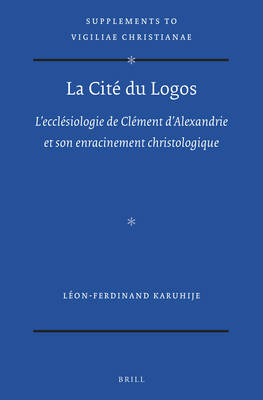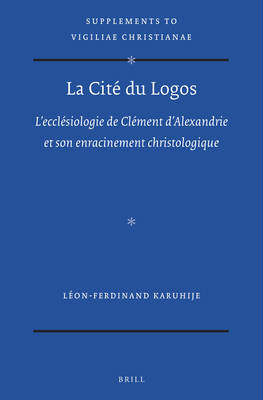
- Afhalen na 1 uur in een winkel met voorraad
- Gratis thuislevering in België vanaf € 30
- Ruim aanbod met 7 miljoen producten
- Afhalen na 1 uur in een winkel met voorraad
- Gratis thuislevering in België vanaf € 30
- Ruim aanbod met 7 miljoen producten
Zoeken
La Cité Du Logos: l'Ecclésiologie de Clément d'Alexandrie Et Son Enracinement Christologique
Léon-Ferdinand Karuhije
€ 344,95
+ 689 punten
Omschrijving
Clément d'Alexandrie (150-215 Ap. J.-C.) est l'un des penseurs les plus brillants des premiers siècles chrétiens. Son enseignement, tout autant pétri de la Bible que de la pensée grecque, nous révèle la nature des débats aux premières heures de l'expansion du christianisme. Ce livre aborde un sujet peu étudié à ce jour, à savoir sa pensée sur l'Église. C'est pourtant un sujet récurent de ses ouvrages, où il réfléchit longuement sur l'Église à partir de l'être et la mission du Logos divin. L'analyse du discours de Clément sur l'Église permet donc de revisiter les intuitions principales de sa christologie tout en apportant un éclairage sur sa perception de l'identité chrétienne à une époque où celle-ci est encore en construction.
Clement of Alexandria (AD 150-215) is one of the most brilliant thinkers of the early Christian centuries. His teaching, steeped as much in the Bible as in Greek thought, reveals to us the nature of the debates in the early days of the expansion of Christianity. This book deals with a subject little studied to this day, namely his thoughts on the Church. Yet it is a recurring subject in his works, where he reflects at length on the Church from the point of view of the being and the mission of the divine Logos. Analysis of Clement's discourse on the Church therefore makes it possible to revisit the main intuitions of his Christology while shedding light on his perception of Christian identity at a time when it is still under construction.
Clement of Alexandria (AD 150-215) is one of the most brilliant thinkers of the early Christian centuries. His teaching, steeped as much in the Bible as in Greek thought, reveals to us the nature of the debates in the early days of the expansion of Christianity. This book deals with a subject little studied to this day, namely his thoughts on the Church. Yet it is a recurring subject in his works, where he reflects at length on the Church from the point of view of the being and the mission of the divine Logos. Analysis of Clement's discourse on the Church therefore makes it possible to revisit the main intuitions of his Christology while shedding light on his perception of Christian identity at a time when it is still under construction.
Specificaties
Betrokkenen
- Auteur(s):
- Uitgeverij:
Inhoud
- Aantal bladzijden:
- 664
- Taal:
- Engels
- Reeks:
- Reeksnummer:
- nr. 173
Eigenschappen
- Productcode (EAN):
- 9789004505353
- Verschijningsdatum:
- 17/06/2022
- Uitvoering:
- Hardcover
- Formaat:
- Genaaid
- Afmetingen:
- 155 mm x 235 mm
- Gewicht:
- 1225 g

Alleen bij Standaard Boekhandel
+ 689 punten op je klantenkaart van Standaard Boekhandel
Beoordelingen
We publiceren alleen reviews die voldoen aan de voorwaarden voor reviews. Bekijk onze voorwaarden voor reviews.








